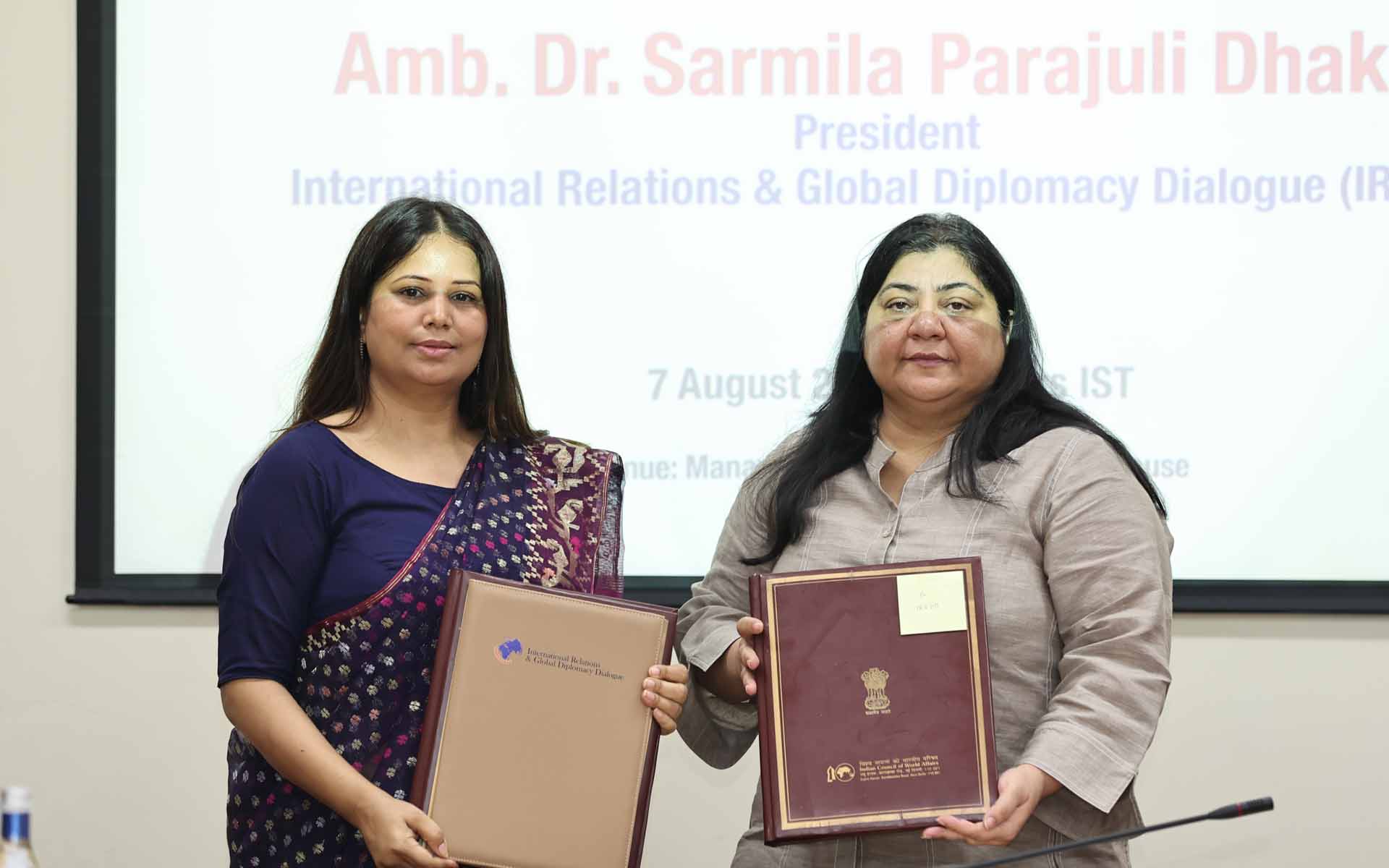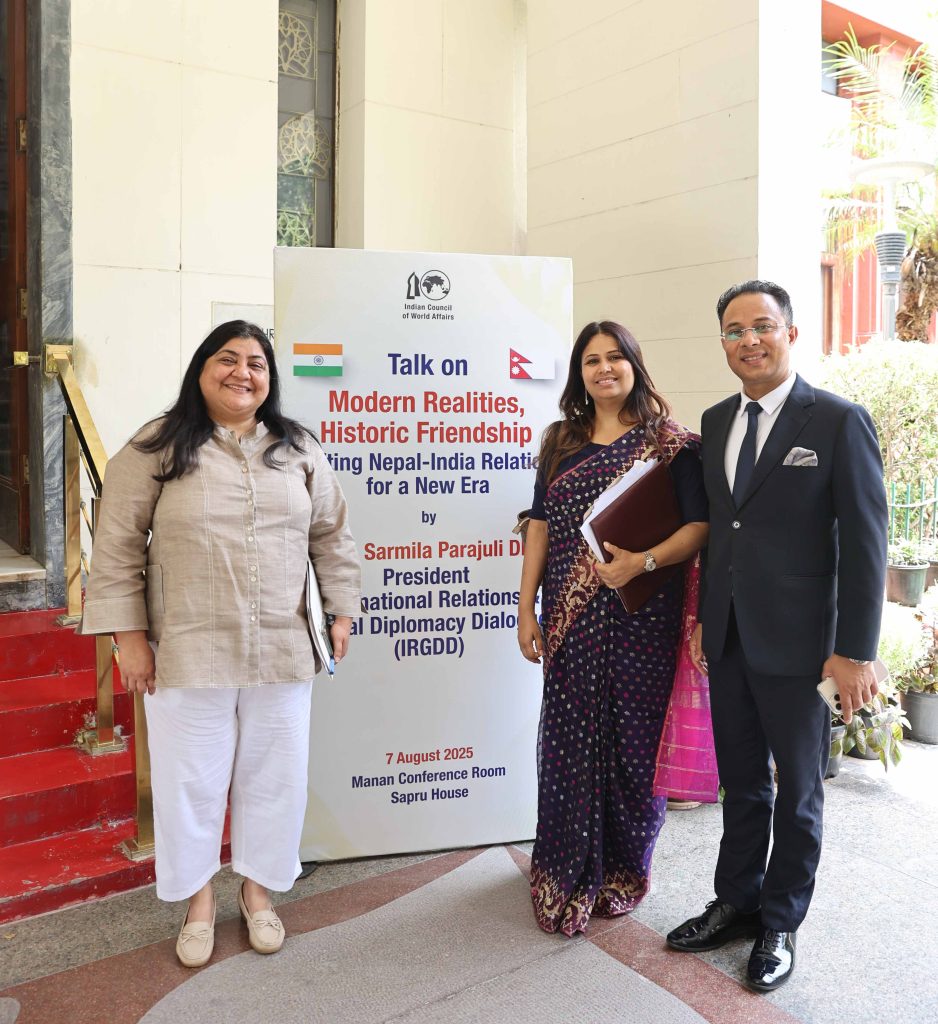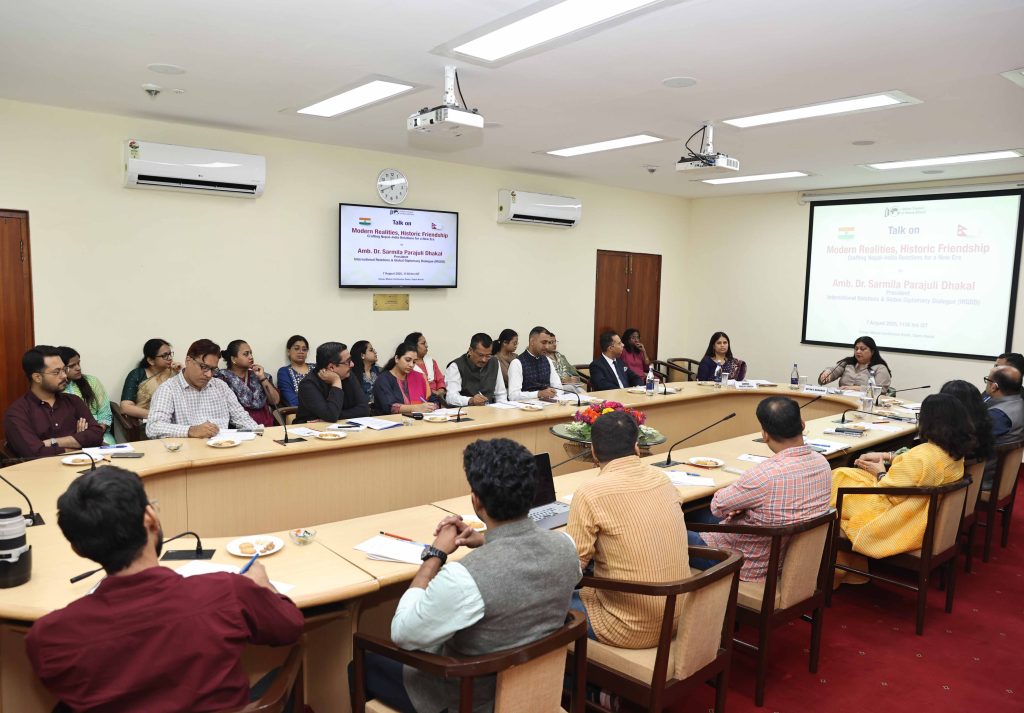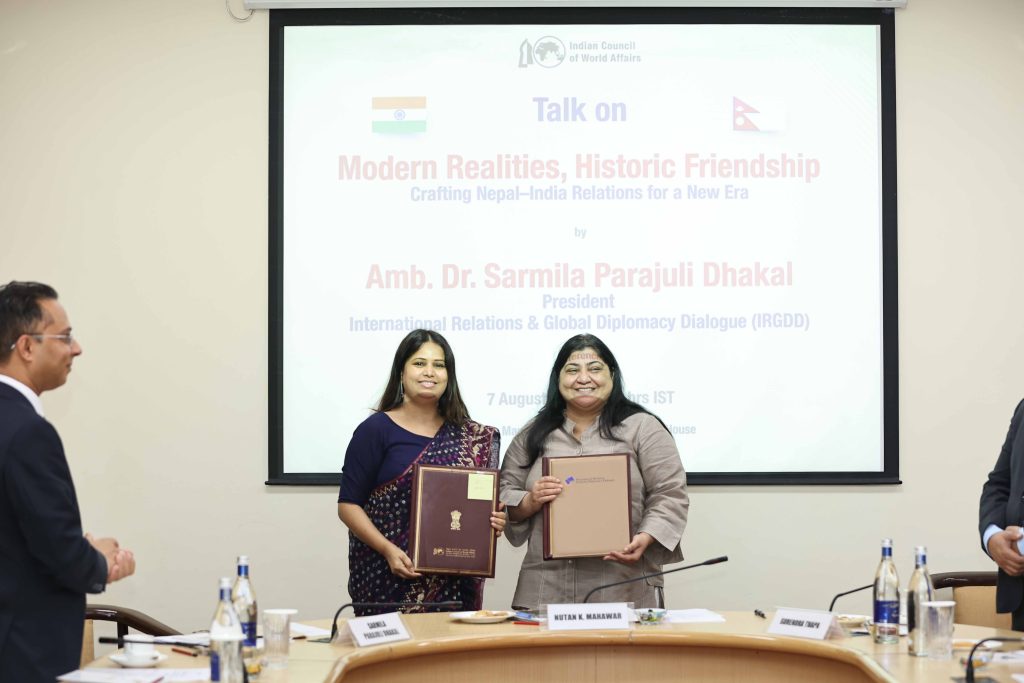
Kathmandu, August 7, 2025: In a significant step toward strengthening Nepal–India bilateral relations at the institutional level, the International Relations and Global Diplomacy Dialogue (IRGDD) of Nepal and the Indian Council of World Affairs (ICWA) signed a landmark Memorandum of Understanding (MoU) in New Delhi on August 7, 2025. The agreement aims to foster long-term cooperation in diplomacy, culture, education, trade, media, and beyond.
The MoU was signed by Ambassador Dr. Sarmila Parajuli Dhakal, President of IRGDD, and Ambassador Nutan Kapoor Mahawar, Acting Director-General at ICWA and Additional Secretary of the Ministry of External Affairs, India, during a formal ceremony at Sapru House, organised by ICWA.
The MoU outlines a shared vision to deepen mutual understanding and institutional collaboration between the two think tanks. It aims to facilitate the exchange of visits by eminent figures in diplomacy, international relations, and allied fields, and to jointly organize seminars, symposiums, and panel discussions on bilateral, regional, and global issues of mutual interest. Cooperation will also include publication exchange, digital linkages between institutional platforms, and reciprocal hosting of events in both Nepal and India.
Speaking at the event, Ambassador Dr. Dhakal emphasized the importance of building a research-based and empathetic diplomatic culture in South Asia. “Let us move from reaction to reflection. From assumptions to understanding. Let us re-write the narrative — together,” she said. “I am confident that IRGDD, in partnership with ICWA, will contribute actively toward building a compassionate, forward-looking diplomatic culture in South Asia and beyond.”
Ambassador Mahawar, Acting Director General of ICWA, stated that the MoU with IRGDD would help foster enduring bilateral ties between Nepal and India. She highlighted that the relationship between the two nations transcends traditional diplomacy, allowing it to endure political fluctuations. Under Prime Minister Narendra Modi’s Neighbourhood First policy, she said, “Nepal remains an extremely important partner.”
The ceremony was attended by diplomats, scholars, dignitaries from both countries, the Deputy Chief of Mission at the Embassy of Nepal in New Delhi Dr. Surendra Thapa, and Bimal Dhakal, publisher of The Diplomat Nepal magazine, among others.
The agreement stipulates that travel, accommodation, and event costs will be shared reciprocally to ensure equal commitment. The MoU takes effect upon signing and allows for flexibility in future amendments through mutual consultation. It is envisioned as a strategic initiative to enhance people-to-people ties and civil society dialogue, offering new momentum for Nepal–India relations by connecting networks of scholars, diplomats, journalists, and professionals working for peace, cooperation, and shared prosperity.
Delivering a special address at Sapru House on the theme “Modern Realities, A Historic Friendship: Crafting Nepal–India Relations for a New Era,” Dr. Dhakal reflected on her diplomatic experiences as former ambassador to Spain and Oman, and on the evolving role of diplomacy in the 21st century. “From consular services to cultural exchange, from safeguarding migrant rights to expanding connectivity — diplomacy, when driven by purpose and people, delivers peace, prosperity, and partnership,” she remarked.
Calling Nepal–India ties a “civilizational continuum,” she highlighted the deep cultural, spiritual, and familial bonds between the two nations. “From Janakpur to Ayodhya, Pashupatinath to Varanasi, and Lumbini to Bodhgaya — these are not just physical pathways, but emotional arteries flowing with centuries of coexistence,” she said.
Acknowledging today’s geopolitical context, Dr. Dhakal praised India’s emergence as a global power and reiterated Nepal’s readiness to walk “side by side” as sovereign partners in peace and development. Nepal’s foreign policy, she noted, is rooted in non-alignment, peaceful coexistence, neutrality, and universal friendship — not ambiguity, but the confidence of a country anchored in values.
She noted Nepal’s “quiet transformation”—from hydropower and highways to climate action and entrepreneurship, reaffirmed that other countries’ economic footprints visible in Nepal, India’s contribution remains foundational to its economy and infrastructure and Nepal’s Prime Minister K.P. Sharma Oli’s upcoming visit to India.
“Let us move beyond fears of influence and forge trust-based, transparent, and transformative partnerships,” she urged, calling on India’s Neighbourhood First policy to be reflected in action as well as intention.
In her remarks, Dr. Dhakal also introduced three platforms under her leadership: IRGDD, Ambassador’s Club Nepal, and The Diplomat Nepal, which aim to enhance Nepal’s global presence through inclusive, strategic, and soft diplomacy.
She concluded by envisioning a shared economic future. With India’s strength in digital technology and manufacturing and Nepal’s potential in clean energy and connectivity, she said both nations could unlock shared prosperity. “Let ‘Made in Nepal’ and ‘Make in India’ rise together,” she added, “creating jobs, infrastructure, and sustainable growth on both sides of the border.”
“Nepal’s new path will be walked with dignity and determination,” she concluded. “Let Nepal and India lead this movement—as co-creators of peace, progress, and purpose. Let us not just reflect — let us reset.”
The program concluded with a question-and-answer session, where Dr. Dhakal engaged with the audience on themes of regional diplomacy, innovation, and civilizational values.
Photos from the MoU event:


